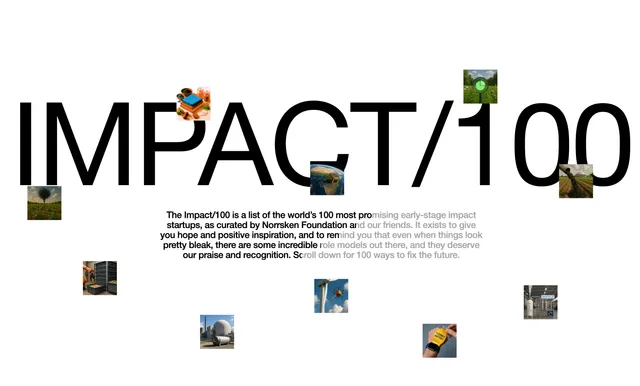APAC’s $5 billion ClimateTech boom didn’t make the Impact/100 list
A global mission with a geographic blind spot? Every region’s startups have an impact on the world - in some, it’s just more apparent.

A global mission with a geographic blind spot? Every region’s startups have an impact on the world - in some, it’s just more apparent.
Norrsken, a Swedish non-profit specialising in supporting “impact entrepreneurs”, recently released its Impact/100 list of the 100 most promising impact start-ups in the world. Reading through the list, there were a few surprises, such as the inclusion of a “spacetech” company (The Exploration Company) for the first time. But what might be even more surprising was the noticeable lack of entrants from two of the world's fastest-growing large-market blocks - APAC and LATAM.

Admittedly, some of the major players in LATAM are having a rough time economically lately – look at Argentina. But the Asia-Pacific region accounts for 60-70% of the increase in global GDP. Surely some start-ups in the region could have made it on a global impact list.
Of the 100 companies listed, 46 were from Europe, which, admittedly, is where Norrsken is based. In contrast, the list contained only two companies from APAC, both in India. There were none from China, South Korea, Japan, or any ASEAN country. Not even any from Hong Kong or Taiwan.
So does this lack of inclusion mean there aren’t any impactful start-ups raising capital in the APAC region, or is this just a quirk of the selection process for the Impact/100 list? A little bit of research points strongly toward the latter answer.
ClimateTech In APAC
Let’s take one of the bigger categories in the 2025 list - ClimateTech. 31 of the 100 companies listed operated in that area. None were in APAC. However, there were at least six separate fundraising rounds for start-ups in APAC that raised more than $200mn last year:
- Avatar Technology - China - Electric Vehicles - $1.51bn
- GDS International / DayOne - Singapore - Data Centres - $1bn
- Zepto - India - Sustainable E-Commerce - $1bn
- Didi Autonomous Driving - China - Autonomous Cars - $275mn
- Scigene - China - Biotech - $232mn
There were also dozens of smaller rounds for earlier-stage start-ups, including all the way down to seed stage:
- Vycarb - Singapore - CCS - $5mn
- UCDI - Japan - CCS - $19mn
- Carbonbase - Hong Kong - Carbon Footprint fintech - $2.5mn
- After Oil - Singapore - Plastics recycling - $7mn (now defunct)
- ChargeUp - India - Battery-swapping network - $7mn
These successes herald a shift away from the still-dominant European/North American axis for VC investment in ClimateTech companies, which accounts for 70-80% of total VC investment in the sector. However, in a broader market context, APAC accounts for about 45% of all ClimateTech investment, including non-VC funding. Several market researchers believe that the region’s share of VC investment could eventually grow at double-digit rates to match its share of overall investment. That would mean a massive opportunity for investors as the region’s ecosystems mature and produce more investment-worthy start-ups.
There have also been so many successful, established ClimateTech companies that have already emerged from the region. China is the world’s largest producer of solar panels by a significant margin, with giants like Jinko Solar producing 90 GW of capacity last year. BYD is now the world’s largest producer of electric cars and is continuing to grow. DJI, though only tangentially related to ClimateTech, offers drones that can inspect wind turbines or even operate inside power plants. These were all early-stage start-ups not long ago and have grown into world-beating companies, in many cases with the help of foreign VC funds.
Why the gap?
So why are the newest crop of potentially world-beating APAC companies notably absent from lists like the Norrsken Impact/100? According to the list’s website, the final 100 were selected from 1,400 nominations from 50 nominators. These include some VC nominators that, at least ostensibly, have deep ties to Asia. One of the newest nominees for this year, Sequoia Capital, has famously been deeply invested in APAC for decades, despite recently spinning off its APAC businesses into separate entities.
There are two reasons why APAC startups are underrepresented on the list. First, the companies had to have raised at least seed/Series A funding and couldn’t have raised anything past Series B. They must also already have a product on the market. Researchers estimate that 80-90% of the climate tech companies that have reached that threshold are based in Europe and North America. APAC is in a far second place, with an estimated 10-20%. LATAM and Africa lag far behind, although several African start-ups in this category have made the Impact/100 list.
Second is the judges' lack of familiarity with the region. The presence of African companies on the list, despite making up a significantly smaller portion of the overall investment pie, is likely indicative of the judges’ familiarity with that sector. It then stands to reason that the nominating committee lacked expertise in the APAC region, since there are many more candidates there than in Africa, at least according to the financial statistics.
Untapped potential
That lack of familiarity presents an opportunity, though. Lists like the Impact/100 highlight certain firms and regions. But if a company doesn’t make the list simply because the nominators weren’t familiar with it, it could present an opportunity for those able to seek them out. APAC accounts for 60% of the world’s population and is one of the regions most affected by climate change, making its people have a vested interest in either solving it or adapting to it with minimal economic disruption. It's also home to some of the fastest-growing economies on the planet, which have had the larger, more mature markets of North America and Europe to offer guidance as they continue to develop.
Given the sheer breadth and depth of APAC’s markets, it might be hard to sort through all the potential it has. But as long as lists like the Impact/100 continue to ignore the impactful companies growing in the far corners of the world, there will be less competition for those willing to go out and find them.



